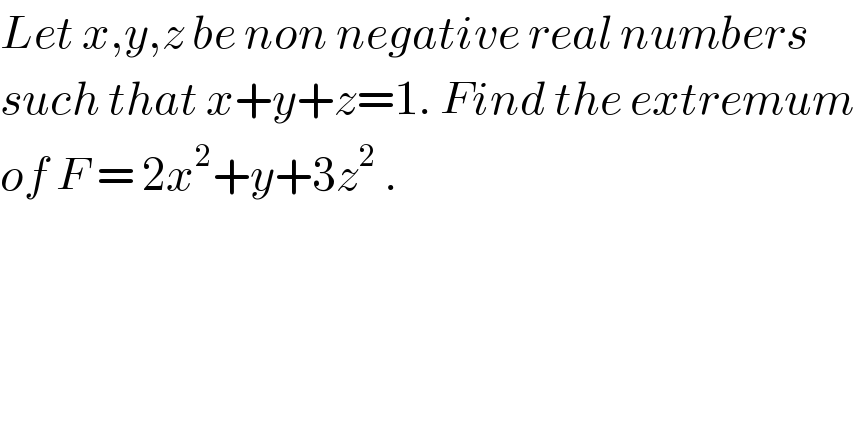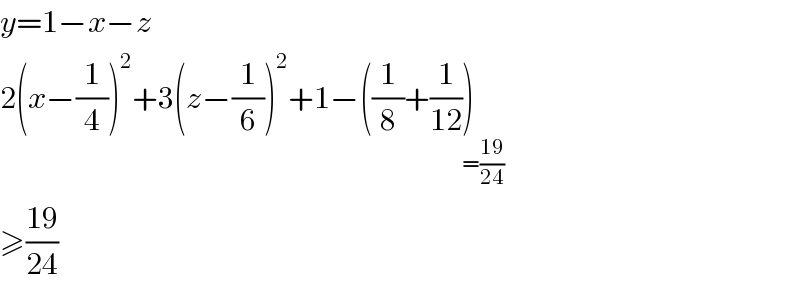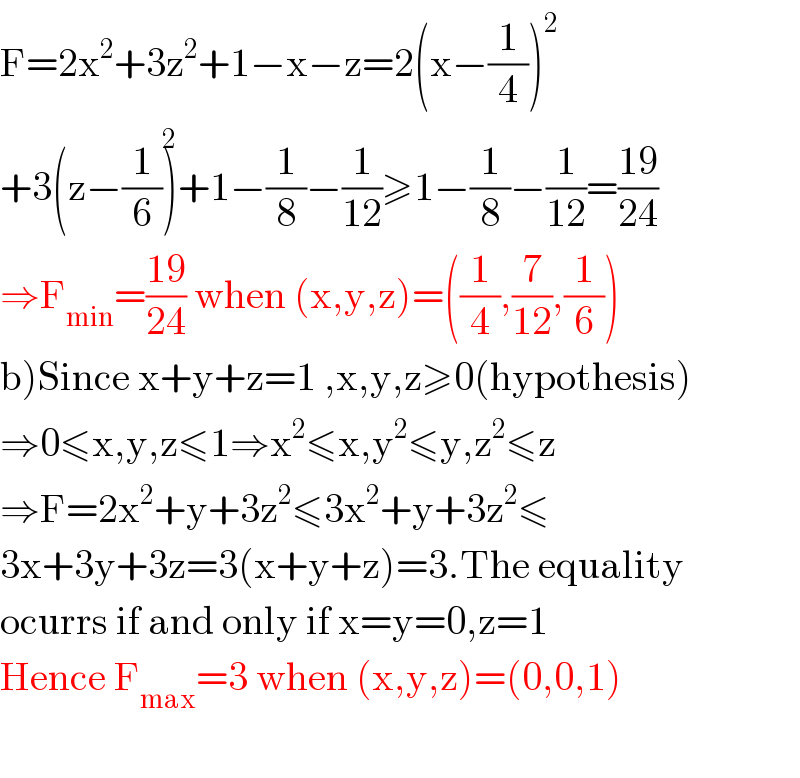Question Number 119724 by benjo_mathlover last updated on 26/Oct/20

$${Let}\:{x},{y},{z}\:{be}\:{non}\:{negative}\:{real}\:{numbers} \\ $$$${such}\:{that}\:{x}+{y}+{z}=\mathrm{1}.\:{Find}\:{the}\:{extremum} \\ $$$${of}\:{F}\:=\:\mathrm{2}{x}^{\mathrm{2}} +{y}+\mathrm{3}{z}^{\mathrm{2}} \:. \\ $$
Answered by mindispower last updated on 26/Oct/20

$${y}=\mathrm{1}−{x}−{z} \\ $$$$\mathrm{2}\left({x}−\frac{\mathrm{1}}{\mathrm{4}}\right)^{\mathrm{2}} +\mathrm{3}\left({z}−\frac{\mathrm{1}}{\mathrm{6}}\right)^{\mathrm{2}} +\mathrm{1}−\left(\frac{\mathrm{1}}{\mathrm{8}}+\frac{\mathrm{1}}{\mathrm{12}}\underset{=\frac{\mathrm{19}}{\mathrm{24}}} {\right)} \\ $$$$\geqslant\frac{\mathrm{19}}{\mathrm{24}} \\ $$
Commented by bemath last updated on 26/Oct/20

$${what}\:{the}\:{max}\:{value}\:{sir}\:? \\ $$
Answered by 1549442205PVT last updated on 27/Oct/20

$$\mathrm{F}=\mathrm{2x}^{\mathrm{2}} +\mathrm{3z}^{\mathrm{2}} +\mathrm{1}−\mathrm{x}−\mathrm{z}=\mathrm{2}\left(\mathrm{x}−\frac{\mathrm{1}}{\mathrm{4}}\right)^{\mathrm{2}} \\ $$$$+\mathrm{3}\left(\mathrm{z}−\frac{\mathrm{1}}{\mathrm{6}}\overset{\mathrm{2}} {\right)}+\mathrm{1}−\frac{\mathrm{1}}{\mathrm{8}}−\frac{\mathrm{1}}{\mathrm{12}}\geqslant\mathrm{1}−\frac{\mathrm{1}}{\mathrm{8}}−\frac{\mathrm{1}}{\mathrm{12}}=\frac{\mathrm{19}}{\mathrm{24}} \\ $$$$\Rightarrow\mathrm{F}_{\mathrm{min}} =\frac{\mathrm{19}}{\mathrm{24}}\:\mathrm{when}\:\left(\mathrm{x},\mathrm{y},\mathrm{z}\right)=\left(\frac{\mathrm{1}}{\mathrm{4}},\frac{\mathrm{7}}{\mathrm{12}},\frac{\mathrm{1}}{\mathrm{6}}\right) \\ $$$$\left.\mathrm{b}\right)\mathrm{Since}\:\mathrm{x}+\mathrm{y}+\mathrm{z}=\mathrm{1}\:,\mathrm{x},\mathrm{y},\mathrm{z}\geqslant\mathrm{0}\left(\mathrm{hypothesis}\right) \\ $$$$\Rightarrow\mathrm{0}\leqslant\mathrm{x},\mathrm{y},\mathrm{z}\leqslant\mathrm{1}\Rightarrow\mathrm{x}^{\mathrm{2}} \leqslant\mathrm{x},\mathrm{y}^{\mathrm{2}} \leqslant\mathrm{y},\mathrm{z}^{\mathrm{2}} \leqslant\mathrm{z} \\ $$$$\Rightarrow\mathrm{F}=\mathrm{2x}^{\mathrm{2}} +\mathrm{y}+\mathrm{3z}^{\mathrm{2}} \leqslant\mathrm{3x}^{\mathrm{2}} +\mathrm{y}+\mathrm{3z}^{\mathrm{2}} \leqslant \\ $$$$\mathrm{3x}+\mathrm{3y}+\mathrm{3z}=\mathrm{3}\left(\mathrm{x}+\mathrm{y}+\mathrm{z}\right)=\mathrm{3}.\mathrm{The}\:\mathrm{equality} \\ $$$$\mathrm{ocurrs}\:\mathrm{if}\:\mathrm{and}\:\mathrm{only}\:\mathrm{if}\:\mathrm{x}=\mathrm{y}=\mathrm{0},\mathrm{z}=\mathrm{1} \\ $$$$\mathrm{Hence}\:\mathrm{F}_{\mathrm{max}} =\mathrm{3}\:\mathrm{when}\:\left(\mathrm{x},\mathrm{y},\mathrm{z}\right)=\left(\mathrm{0},\mathrm{0},\mathrm{1}\right) \\ $$$$ \\ $$
